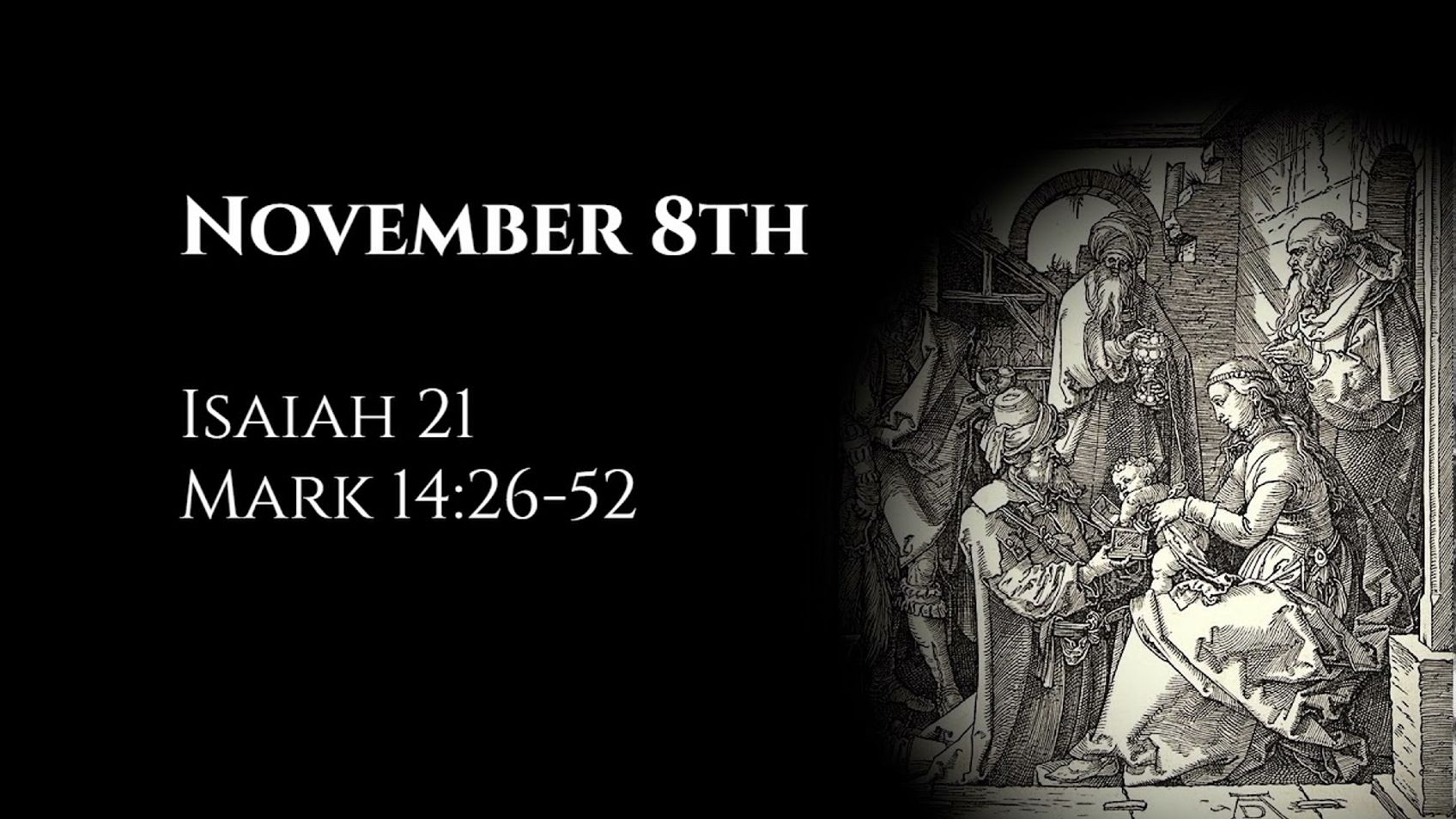November 8th: Isaiah 21 & Mark 14:26-52
November 7, 2021

Alastair Roberts
Oracles concerning Babylon and the Arabians. Betrayal and arrest in Gethsemane.
My reflections are searchable by Bible chapter here: https://audio.alastairadversaria.com/explore/.
If you are interested in supporting this project, please consider supporting my work on Patreon (https://www.patreon.com/zugzwanged), using my PayPal account (https://bit.ly/2RLaUcB), or buying books for my research on Amazon (https://www.amazon.co.uk/hz/wishlist/ls/36WVSWCK4X33O?ref_=wl_share).
You can also listen to the audio of these episodes on iTunes: https://itunes.apple.com/gb/podcast/alastairs-adversaria/id1416351035?mt=2.
More From Alastair Roberts
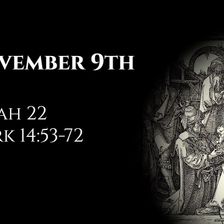
November 9th: Isaiah 22 & Mark 14:53-72
Alastair Roberts
November 8, 2021
An oracle concerning Judah. Jesus before the Sanhedrin.
My reflections are searchable by Bible chapter here: https://audio.alastairadversaria.com/exp
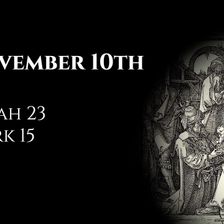
November 10th: Isaiah 23 & Mark 15
Alastair Roberts
November 9, 2021
An oracle against Tyre. The crucifixion.
My reflections are searchable by Bible chapter here: https://audio.alastairadversaria.com/explore/.
If you
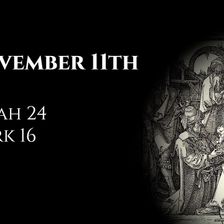
November 11th: Isaiah 24 & Mark 16
Alastair Roberts
November 10, 2021
The Lord's judgment upon the whole earth. The resurrection.
My reflections are searchable by Bible chapter here: https://audio.alastairadversaria.com
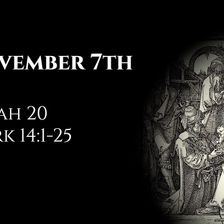
November 7th: Isaiah 20 & Mark 14:1-25
Alastair Roberts
November 6, 2021
Caution against resting on Cush and Egypt. The Last Supper.
My reflections are searchable by Bible chapter here: https://audio.alastairadversaria.com
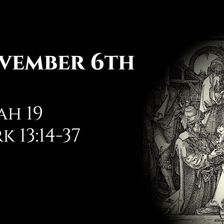
November 6th: Isaiah 19 & Mark 13:14-37
Alastair Roberts
November 5, 2021
An oracle for Egypt. The coming of the Son of Man.
My reflections are searchable by Bible chapter here: https://audio.alastairadversaria.com/explore/
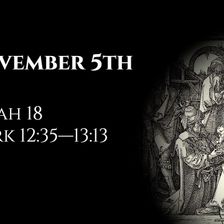
November 5th: Isaiah 18 & Mark 12:35—13:13
Alastair Roberts
November 4, 2021
Messengers to Cush. Judgment upon the Temple.
My reflections are searchable by Bible chapter here: https://audio.alastairadversaria.com/explore/.
If
More on OpenTheo

Are Demon Possessions and Exorcisms in the New Testament Literal?
#STRask
December 11, 2025
Questions about whether references to demon possessions and exorcisms in the New Testament are literal, how to talk to young children about ghosts, an

Christmas Cranks and Christmas Blessings with Justin Taylor and Collin Hansen
Life and Books and Everything
December 17, 2025
If you are looking for a podcast where three friends talk about whatever they want to talk about and ramble on about sports, books, and grievances, th

Can You Provide Verifiable, Non-Religious Evidence That a Supernatural Jesus Existed?
#STRask
November 10, 2025
Question about providing verifiable, non-religious evidence that a supernatural Jesus existed.
* I am an atheist and militantly anti-god-belief. Ho

The Making of the American Mind with Matthew Spalding
Life and Books and Everything
February 2, 2026
The United States is unique in how much attention it pays to its founding, its founders, and its founding documents. Arguably, the most famous and mos

Could the Writers of Scripture Have Been Influenced by Their Fallen Nature?
#STRask
October 23, 2025
Questions about whether or not it’s reasonable to worry that some of our current doctrines were influenced by the fallen nature of the apostles, and h

Why Does the Bible Teach You How to Be a Proper Slave Owner?
#STRask
November 13, 2025
Question about why it seems like the Bible teaches you how to be a proper slave owner rather than than saying, “Stop it. Give them freedom.”
* It s

Shouldn’t I Be Praying for My Soul Rather Than for Material Things?
#STRask
February 2, 2026
Questions about whether we should be praying for our souls rather than for material things, why we need to pray about decisions, whether the devil can

Why Should We Pray If God Already Knows What’s Going to Happen?
#STRask
January 29, 2026
Questions about why we should pray if God already knows what’s going to happen, how the effectiveness of prayer is measured, and whether or not things

What Is Wrong with Wokeness? With Neil Shenvi
Life and Books and Everything
January 19, 2026
In this timely interview, Kevin talks to Neil Shenvi about his new book (co-authored with Pat Sawyer), entitled “Post Woke: Asserting a Biblical Visio

The Man on the Middle Cross with Alistair Begg
Life and Books and Everything
November 10, 2025
If you haven’t seen the viral clip, go see it right now. In this episode, Kevin talks to Alistair about the preaching clip he didn’t intend to give, h

Why Would Any Rational Person Have to Use Any Religious Book?
#STRask
December 8, 2025
Questions about why any rational person would have to use any religious book, whether apologetics would be redundant if there were actually a good, un

Does Open-Mindedness Require Studying Other Religions Before Becoming a Christian?
#STRask
February 9, 2026
Questions about the claim that if Christians really want to be open-minded, they need to read and study other religions before committing to Christian

Can Two Logical People Come to Conflicting Conclusions Without Committing a Fallacy?
#STRask
January 8, 2026
Questions about whether two logical people can come to conflicting conclusions on a topic without committing a fallacy, how Greg, as a public figure,

Does God Hear the Prayers of Non-Believers?
#STRask
February 26, 2026
Questions about whether or not God hears and answers the prayers of non-believers, and thoughts about a church sign that reads (as if from God), “Just

Is Greg Placing His Faith in the Wrong Thing?
#STRask
February 12, 2026
Questions about Greg placing his faith in his personal assessment of which truth claims best match reality rather than in the revelation of God in Jes
